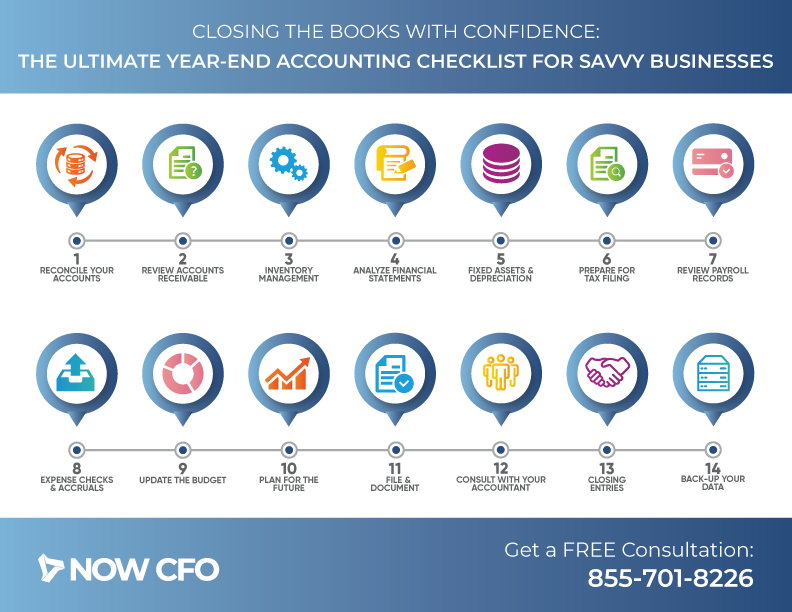Closing the Books with Confidence: The Ultimate Year-End Accounting Checklist for Savvy Businesses
It’s the most wonderful time of the year! As the year draws to a close, businesses of all sizes take on the critical task of closing their books. An organized year-end accounting checklist is essential for ensuring that a company’s financial affairs are in order, allowing for a smoother transition into the new fiscal year. Here’s a guide to help you navigate this process.
The Ultimate Year-End Accounting Checklist
1. Reconcile Your Accounts
Start by reconciling your business accounts, including bank accounts, credit cards, loans, and any other financial accounts. This process verifies that the amounts you have recorded in your accounting software match the actual bank statements, ensuring that all transactions are accounted for.
2. Review Accounts Receivable
Chase up outstanding invoices to improve your cash flow. Send reminders to clients who still need to pay, and consider writing off bad debts to clear your books. It’s also an excellent time to review your credit control procedures to prevent similar issues in the upcoming year.
3. Inventory Management
If your business holds stock, conduct an inventory check to account for all physical merchandise. This inventory count should align with what’s recorded in your books. Discrepancies can indicate theft, loss, or accounting errors that need to be addressed.
4. Analyze Your Financial Statements
Generate key financial reports, such as the income statement, balance sheet, and cash flow statement. These reports provide valuable insights into your business’s financial health, highlighting areas that may need attention, such as increasing debts or decreasing cash flow.
5. Assess Fixed Assets and Depreciation
Review your fixed assets ledger to ensure it accurately reflects the assets owned by your business. Record any new assets purchased and adjust for depreciation. If you’ve disposed of assets during the year, make sure this is also recorded.
6. Prepare for Tax Filing
Gather and organize all necessary documentation for tax filing, including receipts, invoices, and proof of expenses. Work with your accountant to identify tax deductions and credits you may be entitled to and to ensure compliance with the latest tax laws.
7. Review Payroll Records
Ensure all payroll records are accurate and up-to-date. Confirm that you have withheld the correct amounts for taxes and that employee benefit contributions are correctly recorded. Issue any end-of-year bonuses or adjustments before closing your books.
8. Expense Checks and Accruals
Record any end-of-year expenses and make sure all bills have been entered into your accounting system. This may include setting up accruals for expenses that have been incurred but not yet billed.
9. Update the Budget
Review your budget from the past year and update it for the upcoming year. Consider any changes in your business operations, market conditions, or financial objectives that may affect your budgeting.
10. Plan for the Future
Analyze your financial performance and set financial goals for the new year. Identify areas for cost savings, revenue growth, or investment. Developing a strategic plan based on this analysis will help you start the new year with clear objectives.
11. Document and File Appropriately
Good record-keeping is vital for business success. Ensure all financial documents are filed appropriately, whether physically or digitally. This not only helps in staying organized but also ensures you are prepared for any future audits.
12. Consult with Your Accountant
Before you finalize your year-end books, consult with your accountant. They can provide professional advice, ensure you haven’t missed anything, and help you strategize for tax savings.
13. Closing Entries
Make any necessary year-end closing entries to prepare your books for the next fiscal year. This typically involves clearing out your income and expense accounts, transferring the year’s net income to your balance sheet.
14. Back-Up Your Data
Ensure all your financial data is backed up securely. Data loss can be catastrophic for a business, so make sure you have multiple backups in place, including off-site or cloud storage.
Remember, thoroughness now means fewer headaches later, especially as tax season approaches. Turning to the expertise of NOW CFO outsourced accountants to assist in your year-end accounting process can ensure that nothing is overlooked and everything is accounted for professionally and promptly. Our seasoned experts become an extension of your team, helping to navigate the intricacies of closing out your books effectively. By choosing to outsource, you can focus on what you do best: running and growing your business.




